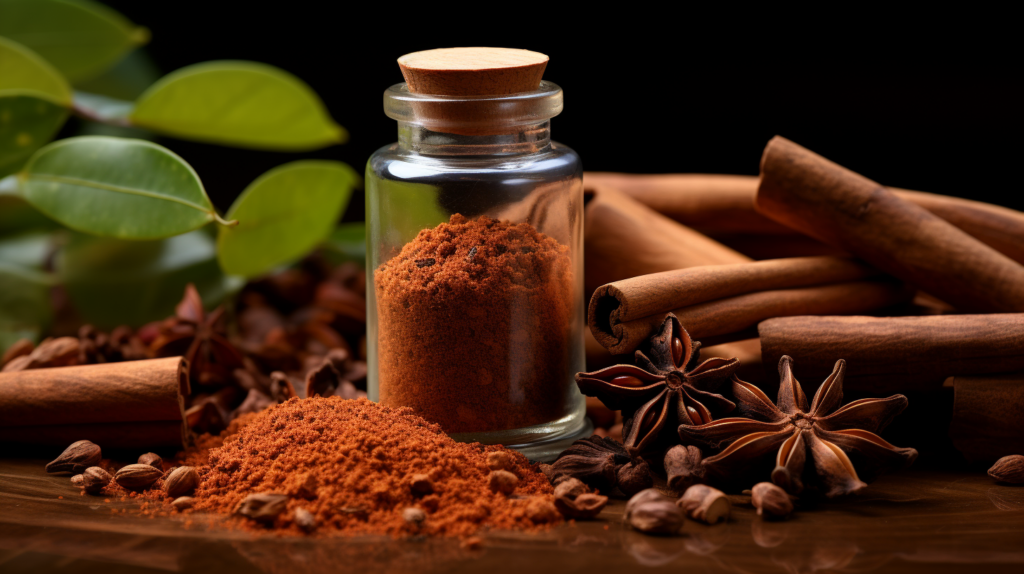Welcome to a world where a delicious spice like cinnamon can do wonders for your health. Did you know that cinnamon is more than just a flavorful addition to your morning oatmeal or afternoon latte? Cinnamon has been used for centuries in traditional medicine for its therapeutic benefits, and modern research has confirmed its health-promoting properties. In this article, we will explore how cinnamon can naturally regulate blood sugar levels, improve digestion, enhance brain function, fight infections, and much more.
Key Takeaways:
- Cinnamon has numerous health benefits, including the ability to regulate blood sugar levels and fight infections.
- Cinnamon may play a role in weight loss and reducing inflammation.
- Cinnamon supports healthy gut function and promotes digestion.
- Cinnamon may have cardiovascular benefits and support heart health.
- Cinnamon may enhance cognitive function and brain health.
- Cinnamon is an antioxidant powerhouse and helps combat oxidative stress in the body.
- Cinnamon’s natural compounds can help fight against bacterial and fungal infections.
- You can easily incorporate cinnamon into your daily diet, and there are cinnamon supplements available for those who prefer them.

The Role of Cinnamon in Regulating Blood Sugar
You may already know that maintaining healthy blood sugar levels is crucial for overall wellness. Cinnamon has been shown to be a powerful natural tool in helping regulate blood sugar levels, making it a popular choice for those looking to support their health in this area.
Research has found that cinnamon can improve insulin sensitivity, allowing the body to more effectively transport glucose to cells where it can be used for energy. This can help prevent spikes in blood sugar levels, which can lead to a host of health issues over time.
In addition to its potential benefits for blood sugar regulation, cinnamon may also aid in weight loss and reducing inflammation. This is because cinnamon activates enzymes that stimulate metabolism and increase insulin sensitivity, leading to better overall health.
The Role of Cinnamon in Regulating Blood Sugar: How it Works
Cinnamon contains compounds that mimic the effect of insulin in the body, helping to regulate blood sugar levels. These compounds, known as cinnamaldehyde and hydroxychalcone, have been shown to be particularly effective in improving insulin sensitivity and glucose tolerance.
Additionally, cinnamon has been shown to slow the breakdown of carbohydrates in the digestive system, leading to a slower rise in blood sugar levels after meals. This can help prevent the sudden spikes and drops in blood sugar that can lead to feelings of fatigue, mood swings, and even diabetes over time.
Overall, incorporating cinnamon into your diet can be a natural and effective way to support healthy blood sugar levels. Consider adding cinnamon to your morning oatmeal or smoothie, or enjoy it as a delicious and warming addition to your favorite baked goods.

Cinnamon’s Impact on Digestion
Cinnamon is known not only for its delicate flavor but also for its ability to support healthy digestion. The spice has been used for centuries as a natural digestive aid and can help alleviate various digestive issues, including bloating, gas, and constipation.
Research has shown that cinnamon can help regulate the digestive system by reducing inflammation and improving gut motility. Additionally, cinnamon is a natural antimicrobial agent, meaning it can help fight harmful bacteria and promote the growth of healthy bacteria in the gut.
Incorporating cinnamon into your diet can be a simple way to support digestive health. Sprinkle cinnamon on oatmeal, yogurt, or fruit for a tasty and healthy breakfast. Alternatively, try adding cinnamon to your tea or coffee for a warm and soothing beverage.

Cinnamon’s Effects on Heart Health
Cinnamon has been shown to have potential cardiovascular benefits, making it a valuable addition to a heart-healthy diet. Studies have found that consuming cinnamon can help lower blood pressure and reduce LDL cholesterol levels, both of which are risk factors for heart disease.
One study showed that consuming just 2 grams of cinnamon per day for 12 weeks resulted in a significant reduction in both systolic and diastolic blood pressure, as well as a decrease in fasting blood glucose levels. Another study found that cinnamon supplementation led to a decrease in LDL cholesterol levels, which can lower the risk of developing heart disease.
In addition to its cholesterol-lowering and blood pressure-regulating effects, cinnamon also has anti-inflammatory properties that can benefit overall heart health. Chronic inflammation has been linked to an increased risk of heart disease, and cinnamon’s ability to reduce inflammation in the body may contribute to its cardiovascular benefits.
Cinnamon’s Effects on Heart Health
Overall, incorporating cinnamon into your diet may have positive effects on your heart health. Whether sprinkled on oatmeal or blended into a smoothie, cinnamon is a delicious and easy way to support your cardiovascular system.

Cinnamon’s Impact on Brain Function
Cinnamon doesn’t just benefit your physical health—it also has the potential to boost brain function and cognitive performance.
Recent studies have shown that cinnamon’s antioxidants can help protect the brain from neurological damage and improve memory and learning abilities. Cinnamon’s anti-inflammatory properties may also play a role in reducing the risk of age-related cognitive decline.
The Role of Cinnamon in Managing Alzheimer’s Disease
Cinnamon’s ability to reduce inflammation and regulate insulin levels may be beneficial for those with Alzheimer’s disease, a progressive disorder that affects memory and cognitive function. In animal studies, cinnamon has been shown to enhance cognitive function and reduce the accumulation of amyloid plaques in the brain, which are associated with Alzheimer’s disease.
While more research is needed, these findings suggest that cinnamon may hold promise in the management and prevention of Alzheimer’s disease.
Incorporating Cinnamon into Your Diet for Brain Health
To reap the brain-boosting benefits of cinnamon, try adding it to your daily diet. Sprinkle cinnamon on top of your morning oatmeal, add it to your coffee or tea, or use it as a spice to add flavor to your meals.
Cinnamon can also be used in baking, making it a versatile ingredient to incorporate into a variety of sweet and savory dishes.

Cinnamon as an Antioxidant Powerhouse
Cinnamon is a potent source of antioxidants, which are compounds that protect our cells from free radicals, unstable molecules that can damage our DNA and lead to chronic diseases such as cancer and heart disease. In fact, cinnamon may contain more antioxidants than some well-known superfoods, such as garlic and oregano.
The antioxidant activity in cinnamon comes from its natural compounds, such as cinnamaldehyde, cinnamic acid, and cinnamate. These compounds work together to neutralize free radicals and reduce oxidative stress in the body.
One study found that taking cinnamon extract supplements for 12 weeks significantly increased antioxidant activity in the blood, as well as decreased markers of oxidative stress. Another study showed that cinnamon can reduce inflammation and oxidative damage in the brain, potentially improving cognitive function and protecting against neurodegenerative diseases.
To make the most of cinnamon’s antioxidant power, try adding it to your daily diet. Sprinkle it on oatmeal, yogurt, or fruit for a healthy and delicious breakfast, or mix it into smoothies or baked goods for an extra boost of nutrition.

Cinnamon’s Antibacterial and Antifungal Properties
Aside from regulating blood sugar levels and aiding digestion, cinnamon has been found to possess antibacterial and antifungal properties, making it a powerful tool in fighting infections.
Cinnamon contains natural compounds such as cinnamaldehyde and eugenol, which have been shown to inhibit the growth of harmful bacteria and fungi. These compounds disrupt the cell membranes of microorganisms, preventing them from functioning properly and ultimately killing them off.
Studies have shown that cinnamon extracts can be effective in treating various infections, including respiratory tract infections, urinary tract infections, and even candidiasis, a fungal infection caused by overgrowth of yeast in the body.
Cinnamon has also been found to enhance the effectiveness of antibiotics, making it a potential complementary treatment for bacterial infections.
Adding cinnamon to your diet may help support your immune system and protect against infections. However, it should not be used as a substitute for medical treatment, especially for serious infections.

How to Incorporate Cinnamon into Your Diet
Incorporating cinnamon into your daily diet is an easy, delicious way to reap its numerous health benefits. Here are some practical tips and ideas:
- Add cinnamon to your morning coffee or tea. A dash of cinnamon can add flavor and health benefits to your morning beverage.
- Sprinkle cinnamon on your breakfast foods. Oatmeal, yogurt, and smoothie bowls are all great options for adding cinnamon.
- Use cinnamon in your baking. Cinnamon can be added to muffins, pancakes, and banana bread for a tasty and healthy twist.
- Add cinnamon to savory dishes. Cinnamon can be used as a spice for roasted vegetables, sweet potato dishes, and even added to marinades for meats.
- Make a cinnamon-infused drink. Boil cinnamon sticks in water for a warming and cozy drink, or add cinnamon to apple cider for a fall-inspired treat.
Experiment with different ways to incorporate cinnamon into your meals and snacks to find what works for you. Just a little bit of cinnamon can go a long way in boosting your health!

Cinnamon Supplements and Precautions
Cinnamon can be a great addition to a healthy diet, but it’s important to take precautions when consuming cinnamon supplements or large amounts of cinnamon in your food. While cinnamon is generally safe, it may interact with certain medications or cause allergic reactions in some people. Consult with your healthcare provider before starting any new dietary supplement or significantly increasing your cinnamon intake.
If you do decide to take cinnamon supplements, it’s important to choose high-quality products from reputable sources. Look for supplements that contain pure cinnamon extract, rather than cinnamon oil or other additives. The recommended daily dose of cinnamon supplements varies depending on the product and your individual health needs, so be sure to follow the instructions on the label or consult with your healthcare provider.
While cinnamon is generally considered safe, consuming large amounts can cause adverse effects such as digestive issues, mouth sores, or liver damage. Stick to moderate amounts of cinnamon in your diet and avoid consuming large doses or applying cinnamon oil directly to the skin, as this can cause irritation or allergic reactions.
Overall, cinnamon can provide a variety of health benefits when consumed in moderation as part of a healthy diet. Consult with your healthcare provider before starting any new dietary supplement or significantly increasing your cinnamon intake to ensure it is safe and appropriate for your individual needs.

Conclusion
Cinnamon is more than just a spice that adds flavor to your favorite dishes. Its numerous health benefits make it a valuable addition to any diet. Cinnamon’s ability to regulate blood sugar levels, promote healthy digestion, support heart and brain health, act as an antioxidant powerhouse, and fight against bacterial and fungal infections make it a true superfood.
By incorporating cinnamon into your daily meals and snacks, you can take advantage of its health benefits. Sprinkle it on oatmeal or yogurt, add it to your morning coffee, or use it as a spice in savory dishes. With its versatility and nutritional value, cinnamon is an easy and delicious addition to any diet.
Remember to Use Cinnamon Supplements Safely
If you choose to use cinnamon supplements, it’s important to do so safely. Consult with a healthcare professional to determine the appropriate dosage and potential interactions with any medications you may be taking. Additionally, be sure to look for high-quality supplements from reputable sources.
Cinnamon is a natural and safe way to support your health and wellbeing. By incorporating it into your diet and using it responsibly, you can reap the many benefits it has to offer.
FAQ
Q: What are the health benefits of cinnamon?
A: Cinnamon has numerous health benefits, including its ability to regulate blood sugar levels, fight infections, support digestion, promote heart health, enhance brain function, act as an antioxidant powerhouse, and possess antibacterial and antifungal properties.
Q: How does cinnamon regulate blood sugar?
A: Cinnamon helps regulate blood sugar by increasing insulin sensitivity, reducing insulin resistance, and slowing down the breakdown of carbohydrates in the digestive system.
Q: Can cinnamon aid in weight loss?
A: While research is limited, some studies suggest that cinnamon may have potential benefits for weight loss by improving insulin sensitivity and reducing inflammation in fat cells.
Q: Is cinnamon beneficial for digestion?
A: Yes, cinnamon can benefit digestion by promoting healthy gut function, reducing inflammation in the digestive tract, and soothing stomach discomfort.
Q: How does cinnamon impact heart health?
A: Cinnamon may have positive effects on heart health by reducing risk factors such as high blood pressure and cholesterol levels, improving blood circulation, and reducing oxidative stress.
Q: Can cinnamon improve brain function?
A: Some research suggests that cinnamon may enhance cognitive function, improve memory, and protect against age-related neurological disorders due to its anti-inflammatory and antioxidant properties.
Q: What makes cinnamon an antioxidant powerhouse?
A: Cinnamon contains various antioxidants that help neutralize harmful free radicals in the body, reducing oxidative stress and protecting cells from damage.
Q: Does cinnamon have antibacterial and antifungal properties?
A: Yes, cinnamon possesses natural compounds that can help fight against bacterial and fungal infections, making it a useful ingredient for maintaining overall health and wellness.
Q: How can I incorporate cinnamon into my diet?
A: There are numerous ways to incorporate cinnamon into your diet, including adding it to oatmeal, smoothies, yogurt, baked goods, and even savory dishes like roasted vegetables or curries.
Q: Are there any precautions to consider when using cinnamon?
A: While cinnamon is generally safe for most people, it may interact with certain medications, and high doses or long-term use may have potential side effects. It is always advisable to consult with a healthcare professional before using cinnamon supplements or making significant dietary changes.














